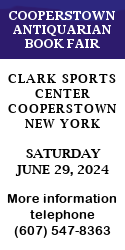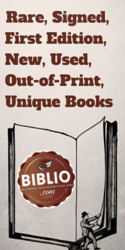Confessions of a Packrat
Before 1985 I was a bookseller—more to the point a bookseller handling out-of-print, second-hand and rare books. In those days we called ourselves antiquarian booksellers even though most of us were not that old.
I don’t know why or how others gravitated to antiquarian bookselling, but for me I think it had a lot to do with the combination of an early passion for books and reading and also of having been a child of the Great Depression. And even though I was born too late for the experience—my parents, especially my father, never let me forget what I was too young to remember.
In our house very little was wasted. During WWII my father had a really large organic Victory garden, went around turning out lights, and otherwise did not suffer expenses gladly. I remember my grandfather sitting in the late afternoon sun by the tool house door helping out by tying together bits of string he had saved, winding it into large balls for my father to use when he laid out the rows for spring planting.
At the dinner table we were expected to clean our plates because somehow that would help the poor starving children in Greece, and if we failed in our duty to the poor starving children in Greece, there were always the compost piles where everything eventually found its way back to the garden. I sometimes wondered if the poor starving children in Greece had compost piles.
Books were always around. Our library, larger than what most of our neighbors had, was filled with the usual furniture—Harvard Classics in faux red leather, works of Cooper and other 19th century writers, a set of the Book of Knowledge (fascinating then and now), the Compton Encyclopedia, and whatever my parents had purchased from the two local book/stationery stores or the Book-of-the-Month Club. At one point BOMC offered Morley’s Haunted Bookshop and Parnassus on Wheels as a bonus and when I read them I was influenced more than I knew at the time. For a while I was hooked on the Hardy Boys series and later on discovered Albert Payson Terhune (a natural because of my interest in dogs) and Jack London.
When writing to Santa Claus or when asked what I wanted for birthdays, books always headed the wish list. No one had garage sales in those days—clothes were passed back and forth between brothers, sisters and cousins, toys were fewer and generally well cared for, and for most of us being given books to read was a reward not a punishment.
Later on I discovered the Book Find Club, Marlboro Book Sales, and while at university in Connecticut, Witkower’s book store on Asylum Avenue in Hartford. Even then books seemed plentiful and cheap and at library and private house sales books usually went begging—bringing nickels, dimes and quarters when they should have brought dollars.
Like many people who grew up in the shadow of the Depression I continue to love bargains and find it hard to throw away anything that might be useful or valuable to someone. I think conservationists, ecology-minded people and fiscal conservatives all share this tendency—we don’t like to waste resources of any kind. In my case the habit persists to the point that some of the things that accumulate so effortlessly around here include:
Computers. I have six at last count and only two of them are connected to the Internet. Another one, with our most valuable data, has had the modem disconnected, a fourth with a tiny hard drive and an MS-DOS operating system sits on the floor taking up space, and two ancient KayPros with CPM operating systems are stored somewhere in the attic. The reason the three oldest machines haven’t been hauled off to the local landfill and recycling emporium is that I have this fanciful notion that I’ll be able to donate them to a computer museum or unsuspecting collector of old technology. Meanwhile, our place is in danger of becoming a computer museum.
Radio parts. My father experimented with and built crystal sets and vacuum tube radios when he was in high school. When I came along he handed off his out-dated accumulation of induction coils, capacitors, resistors, vacuum tubes and so forth, thinking I would do something with them. But beyond building a crude ionic oscillator, a Heathkit audio amplifier and a few other things, I never did. The stuff still sits around in boxes under my workbench—maybe the computer museum that exists in my imagination will take it all as part of a package deal.
Wine corks. Some years ago when we graduated from jug wine to the better reds from Australia and Spain (and lately Pinot Noirs from Oregon), I started to collect imprinted corks from bottles we really liked. They accumulated at an embarrassing rate, so our “collection” has been frozen to whatever will fit into one of the small drawers of the kitchen sideboard—I think there might be room for just one or two more.
Clothes. Working from a wing of the house that serves as our home office means I get to wear casual clothing: button-down shirts, sweaters and khakis in cold weather—polo shirts and khakis in warm weather. My clothes have a long half-life—after they’re too shabby to be worn in polite company, they become my gardening clothes, then my painting clothes, and finally what I wear when I seal our blacktop driveway. It’s amazing the mileage I get from a good pair of khakis—nothing beats them for neatness, toughness and durability. For the record, I find blue jeans too delicate and with a tendency to fray and fall apart after being worn a few times—they’re better left to fashionistas and others who don’t stress their clothes with a lot of outdoor activity (but might want to pretend otherwise). At any rate, after doing driveway duty and with some symbolic wailing and gnashing of teeth, the tar-stained khakis earn their final reward in the local landfill.
Wood scraps: I’ve learned the hard way that serious building and re-modeling is best left to professionals, even though over the years I’ve had to do a fair amount of both. But whatever the project, I’ve saved nearly every end-piece of white pine board, scrap two-by-four, left over plywood or trim molding I’ve ever cut and probably have enough to build nesting boxes for most of the birds in the neighborhood. And although I do use some of it from time to time, a friend who has a business making wooden toys has promised to recycle as much of it as he can. Patience rewarded.
Tools: Since we garden a lot, I tend to accumulate extra hoes, rakes, hand cultivators, pruning shears of various design, trowels, edgers, spading forks, post hole diggers (I have two), shovels, grass clippers, and any interesting old gadget that looks like it might be useful. Older tools tend to be more rugged than many of the newer ones and until recently they went for next to nothing at country auctions. Lately, however, the limitations of my garage and tool house have caused me to re-assess—beyond a second tool for backup, do I really need a third? Or a fourth?
Books: Originally I only bought them to read, but later on found it hard to pass up on all the good used books that could be picked up for very little and set aside for another day. The problem was they began to pile up faster than I could read them—so what to do?
While a graduate student I happened upon a copy of Antiquarian Bookman, later called AB Bookman’s Weekly (now defunct) and discovered that besides the occasional bookstore selling used books, there was an organized antiquarian and rare book trade with a world-wide network. This is for me, I thought—a chance to combine vocation with avocation, work with pleasure, eating one’s meat and having one’s pudding (as Pink Floyd teaches us), and so forth. The rude awakening came, as it does to many bibliophile-booksellers, when it finally dawned on me that not everyone is an avid reader. So when I opened a small bookshop in the late 60s I discovered that, with some notable exceptions, most people around here already had a book. With a growing stock of books and no background in market research or any other form of business training, trying to make a go in the antiquarian book trade became an adventure in trial and error. But thanks to the telephone, printed catalogues and the post office, university libraries and private collectors offered a much larger market. Because it was easier to sell a thousand dollar book to a distant library or collector than it was to sell a thousand one dollar books locally, common sense dictated a move up market towards the rare book end of the business where prime retail space was a luxury, not a necessity.
In recent years, however, this magazine has pushed my bookselling activities to the side while at the same time the Internet has revolutionized the business. Still, they continue to accumulate because I find it hard to pass up interesting books, common or uncommon, wherever I find them. And just down the road from that computer museum, there’s an imaginary side street where the rents are low and plenty of good second-hand and antiquarian bookshops are waiting to offer readers and bibliophiles a year-round Fourth Avenue experience.

























